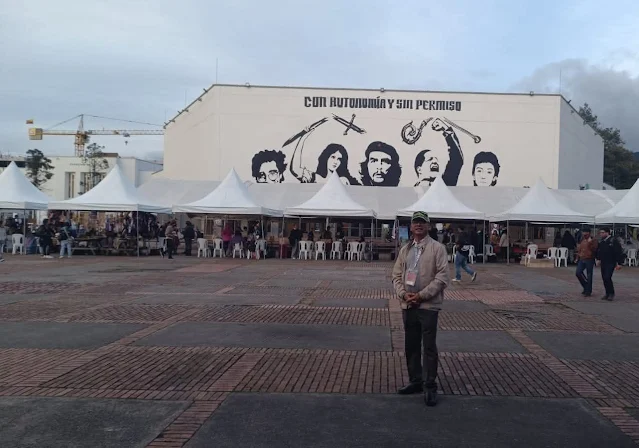After several days of travel and digital silence, I returned from a rare and deeply moving journey into the Amazon region of Colombia. It was not just another field trip, but an opportunity to witness the pulse of Latin America’s land rights movement, firsthand. Alongside members of the International Land Coalition, I participated in the Global Land Forum, a remarkable gathering that kicked off with the celebration of Colombia Day. Over 700 participants — activists, lawmakers, policy experts from nearly 100 countries — converged to deliberate on some of the most pressing issues concerning land and natural resources.
At the heart of the conversations was one central theme: land distribution. It remains the defining political question across Latin America, especially for Indigenous communities and Afro-descendant populations who have borne the brunt of historical injustices and systemic exclusion. Their demand is not just for land, but for dignity, autonomy, and recognition.
Travelling to what is often called the “Golden Gate of the Amazon,” I encountered a living history of resistance — a movement that continues to challenge centuries of colonial repression and extractive exploitation. The Amazonian territories are not just lush green landscapes; they are storied battlegrounds for Indigenous land rights, where culture and nature co-exist in a delicate, intentional balance.
The current Colombian government is, for many, a rare moment of hope. It represents a departure from two centuries of authoritarian rule that served the interests of colonial and neo-colonial powers. For Indigenous people, this is a long-awaited recognition of their rights, their culture, and their vision for the future. South America, having endured centuries under Spanish domination, has seen its native languages, identities, and belief systems nearly erased. Yet, the Indigenous peoples persisted. They protected, preserved, and passed on their traditions. And today, they are leading the charge toward a more just and sustainable society.
What stood out in every interaction was their deep connection with nature — an unbroken bond between people and land, uncorrupted by consumerism or the market. Their lives are shaped by a profound respect for the earth, one that the modern world would do well to learn from. There can be no sustainable future, no meaningful climate action, and no viable conservation efforts without Indigenous leadership. Their inclusion in the highest decision-making spaces is not optional — it is essential.
Across Latin America, a progressive wave is surging. It draws strength from a long tradition of resistance, influenced by revolutionary thinkers like Che Guevara and Fidel Castro, and contemporary leaders such as Francia Márquez and Alberto Tunubalá. These leaders are not just symbols; they are catalysts of transformation who speak to the aspirations of millions.
At the Colombia Day celebrations held at the National University of Colombia — a bastion of intellectual and political activism — ministers from Brazil, Peru, Ecuador, and Colombia made impassioned pleas for expedited land reforms and just redistribution. It was especially powerful to hear Indigenous women ministers from Colombia, grounded in lived experience, articulate their vision with clarity and conviction.
The National University, one of Latin America’s premier institutions, is itself a living testament to political engagement. From the legacy of Gabriel García Márquez to the present-day student protests, its walls and squares — including the iconic “Che Square” — echo the ideals of justice, solidarity, and anti-imperialism. Murals speak volumes, drawing connections from the local to the global — from Indigenous rights to Palestinian resistance.
These symbols matter. They remind us that the struggle for land is also a struggle for identity, memory, and agency. And as global capital seeks to seize control of natural resources in the Global South, we must remain vigilant. Narratives are shaped by the powerful — often with the help of a compliant media. In such times, truth becomes revolutionary.
Let us stand with the movements for peace and justice. Let us resist the tyranny of elites who disguise their greed as development. And above all, let us listen to those who have been the stewards of the land since time immemorial — the Indigenous peoples, whose wisdom is our best hope for a sustainable future.
---
*Human rights defender


Comments